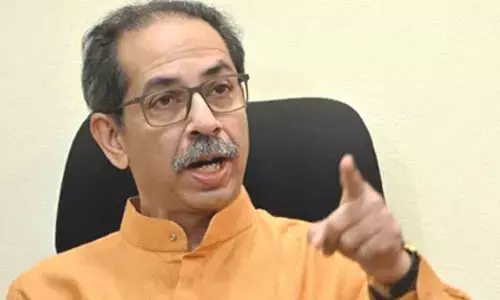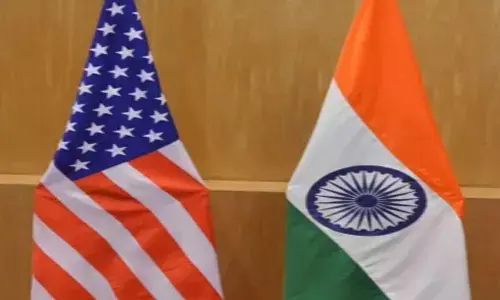Towards true secularism

The victory of NDA in the 2014 elections was built on the grounds of corruption, policy paralysis and economic growth
The victory of NDA in the 2014 elections was built on the grounds of corruption, policy paralysis and economic growth. Caste- and religious divisions were on the backfoot. The last five years have seen a dramatic turnaround.
Religious issues such as cow protection and Ram Temple are to the fore. The juxtaposition of Ali and Bajrang Bali by UP Chief Minister Adityanath is just one indicator of the reversal of the narrative.
We, the citizens of India, must come to grips with these religious divisions so that our energies can be channeled in securing economic welfare. So far, we have followed the path of secularism. It does not work as we can see in the deepening religious divisions.
Secularism suggests that religions must coexist peacefully. It is built on the assumption that the religions are different — maybe even opposed to each other. The premise is that the One God has given different messages to different religions.
That raises the question "Which is the true message?" A contest takes place between "my message" and "your message." This causes emotional rift. The fact that all the three major religions in our country — Hindu, Islam and Christianity — proclaim that there is only One God is pushed to the background.
The Isavasya Upanishad states that all that exists is Brahman. There is nothing other than Brahman. The Bible states at Isaiah 44.6: "I am the first and I am the last and there is no God other than Me."
The Quran says at Sura 6: "There is only One Allah. There is none equal to Him." We are fighting amongst ourselves despite believing in the same One God.
The true nature of God has not been resolved satisfactorily yet. However, there appears to exist an agreement that God is not a person like us with a physical body, a mouth and a voice.
So how does God convey His message? It appears that great persons like Krishna, Moses and Mohammed were able to establish contact with God. God gave them certain inspirations or directions which they expressed in words as per their understanding.
Then these words were transmitted orally for long periods before they were written down. The message went through a long journey in reaching to us. First, the divine inspiration given by God was expressed in words.
For example, God may inspire a Holy Person (such as Moses, Krishna or Mohammed) to wage war. Now whether the 'war' means spiritual war, intellectual war or physical war would depend upon the temperament and understanding of the Holy Person.
Then there is a long gap of time between the words spoken by the Holy Person and that the words that are available to us. For example, the life and sayings of Rama took place at approximately 2100 BC but the writing of the Valmiki Ramayana that took place at approximately 300 BC.
For 1,800 years the story of Rama was transmitted orally. Likewise, Moses was given the commandments by God around 1500 BC. The Jews invaded and lived in Palestine thereafter. Later they were enslaved and taken to Babylon.
Saint Ezra brought the sayings of Moses from Babylon to Palestine around 600 BC. This was followed by a long period of oral and written transmission. The earliest written text of the Bible available to us is the Aleppo Codex dating to about 900 AD.
So, about 2,400 years passed between the giving of the commandments by God to Moses and they being written as available to us. The situation of the Quran is better but suffers from the same problems, nevertheless. The Quran was revealed by Prophet Mohammed when he went into a trance.
The words uttered by him in trance were confirmed by the Prophet later. However, about a hundred years later, there arose questions about what exactly was truly revealed.
At this time Caliph Uthman took upon himself the responsibility of compiling the true Quran. He ordered all other copies of Quran to be burnt. That means that there existed other dissenting versions. The Quran available to us is the one that was organised by the Caliph as per his understanding.
Then, the words were chosen by the Holy Person to express the inspiration in words. For example, it could be expressed by tribal leaders as 'Take bow and arrow and attack.' The same inspiration could be expressed by a modern army man as 'sit on a computer and launch a patriot missile.'
Lastly the meaning of the words expressed by the Holy Person is derived by the present religious leaders. Whether 'wage war' should be understood as waging war against non-believers or against other believing religions is, therefore, decided by the living religious leaders. God's inspiration is consistent with both the interpretations.
As a result, none of the religions as known to us today may have the true word of God as it was revealed. They are like the blind men describing the elephant. One says the elephant is like a pillar, another says it is like a fan and third says it is like a broom.
All are correct yet incorrect. Yet they all are divine. The proof is that they have provided succor to large numbers of people over millenniums.
The divisions between the religions we see today may be more due to the errors in understanding the Word of God that have entered in course of the long periods of transmission.
All religions proclaim the existence of One God. It follows that the message also has to be One. The task before us is to rediscover that One message. This is possible only if all religions accept that there is a gap between the word of God as originally revealed; and as available in their texts.
A dialogue between religions with such underlying flexibility alone will help us reach the true message of the One God.
The present model of secularism does not rise to the occasion. It accepts that One God has given different messages. It only seeks to establish worldly coexistence between people believing in different messages. It is like asking the cat and the dog to live together.
The present elections regress from this noble path. People have once again been captivated by divisions based on religion. Secularism has already failed. The way forward is for the true believers of different religions to come together and arrive at a common Word of God.
Author was formerly Professor of Economics at IIM Bengaluru















